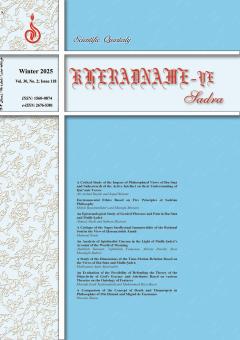A Critical Study of the Impact of Philosophical Views of Ibn Sīnā and Suhrawardī of the Active Intellect on their Understanding of Qur’anic Verses
Subject Areas : Studies on Islamic philosophy and wisdom
Ali Arshad Riyahi
1
![]() ,
Sajad Rahimi
2
,
Sajad Rahimi
2
![]()
1 - Professor at the Islamic Philosophy and Wisdom Department, University of Isfahan, Isfahan, Iran
2 - MA in Islamic Philosophy and Wisdom Department, University of Isfahan, Isfahan, Iran
Keywords: Ibn Sīnā, Suhrawardī, Active Intellect, philosophical interpretation, philosophical esoteric interpretation,
Abstract :
In the philosophies of Ibn Sīnā and Suhrawardī the Active Intellect is the last immaterial existent in the vertical chain of the intellects. The duty of this Intellect is to administer the lower world, create human souls, grant intelligibles to human beings, and, teach and issue the divine orders to the prophets. Ibn Sīnā and Suhrawardī, as two distinguished philosophers of the Peripatetic and Illuminationist Schools, respectively, have discussed this Being and His Attributes in their various works based on their own philosophical ideas. The views of these two philosophers regarding the Active Intellect have greatly influenced their understanding of Qur’anic verses and resulted in their presentation of philosophical or, in some cases, esoteric interpretations. This paper provides a critical analysis of the impact of the philosophical views of Ibn Sīnā and Suhrawardī of the Active Intellect on their understanding of the verses of the Qur’an. To accomplish this task, after examining all of their works, the authors have extracted the Qur’anic perceptions of these two philosophers, which have been influenced by their views of the Active Intellect, and explained the quality of their proofs. Next, they have critically examined the mentioned extractions based on their lexical meanings, science of interpretation, and the related philosophical views and traditional sciences comprehensively and concluded that most of their impressions are unacceptable.
